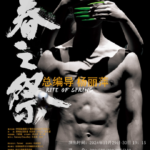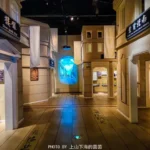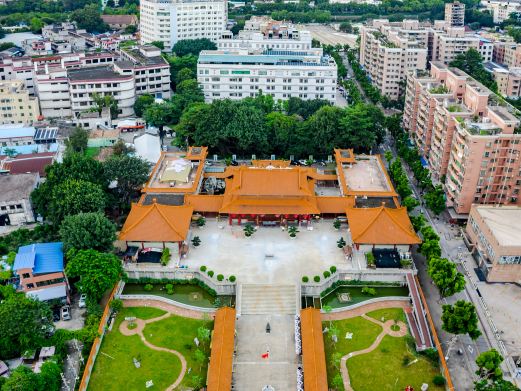Selected as one of the top ten dramas of 2021 by the Beijing News ‘Most Artistic’ Performance List, included in the 7th ‘China Original Drama Invitational Exhibition’, invited to the 9th Wuzhen Theatre Festival, nominated for the Best Small Theater at the 6th Chinese Language Drama Awards, and showcased in the 2023 Shanghai Jing’an Modern Drama Valley. The term ‘ping’ refers to a chessboard. As the name suggests, ‘The Double Chessboard’ narrates two games of chess – both a long-abandoned unfinished game between old friends and the intricate maneuvers of the three protagonists, Cheng Wuyou, Lang Shiyou, and Lu Po’an, amidst the tumultuous times of national salvation.
‘The Double Chessboard’ takes ‘rescuing Cheng Wuyou’ as its thread, unfolding the turbulent and fragmented times of the past two decades, as well as the unity, estrangement, and conflict among the three once-idealistic scholars during this period. The righteousness of the land, the bond of true friendship, and the humble commoners all reunite amidst the melancholic rain, igniting faint flames. One side plays with black, spreading like a flock of magpies on branches; the other with white, leading like geese flying to a marsh. Although black and white seem to be in constant competition, the players support each other in the obscure gray. Despite the hardships of the world, there are still old friends to rely on. Minimalist stage design, with light and shadow conveying artistic conception. This play, along with ‘The Four Machines’, is designed by the same stage designer, and the setting of the stage space also has a sisterly charm: the once-freewheeling teachers’ meeting room, now a cell where one dare not speak loudly – the passionate phrase ‘out of the research room, into the prison’ has come true, and the two look at each other as if separated by an era. The Nine People team has always pursued the spirit of craftsmanship in stage props, with a table, chair, lamp, and chessboard in the prison room, all retaining the most detailed depictions under a minimalist style. Besides the Jiangning Detention Center, the play also uses light and shadow effects to create two supporting scenes – Nanjing Confucius Temple and Beijing West Four Archways, which not only provide a bright and warm color layer for the entire play but also contain narrative clues and key imagery for attentive audiences to discover and interpret. Old tunes, new compositions, listening to the rain in the corridor. Following the Kunqu opera of ‘The Four Machines’ and the Suzhou Pingtan of ‘Spring’s Farewell’, ‘The Double Chessboard’ innovatively integrates Nanjing Baiju and Beijing Clapper Talk into the plot through the characters of Feng Xiaohan and Shao Yuzheng, making the stories of the two cities in the north and south unfold more naturally and fittingly. Jiang Jie’s ‘Yu Mei Ren · Listening to the Rain’ says, ‘In youth, I listened to the rain on a song pavilion, with dim red candles and chaotic silk curtains… Now, listening to the rain under a monk’s hut, my temples are already speckled…’ This directly echoes the life experiences of the three protagonists. In ‘The Double Chessboard’, not only are these two verses of ‘Yu Mei Ren’ recomposed into Jiangnan tunes, but the ending song ‘Listening to the Rain’ is also written in the style of the new poetry of the Republic of China, continuing the image of old friends listening to the rain under the corridor, and echoing the plot.Double plays are performed in succession, interlocking. The stories of the universe in the Republic of China are independent of each other and also footnotes to each other. ‘Four Sheets of Paper’ is the passionate questioning of young people, vowing to compete for a victory or defeat. ‘Double Chessboard Record’ is the hidden edge and reservedness of middle-aged people. Although they have to accompany the impermanent world, when the sharp sword is unsheathed, it still has its starlight. This late winter, the two works will usher in double plays in succession in Shenzhen – connected end to end and interlocking. The vigor and humor, freedom and perseverance of intellectuals in the Republic of China are all reflected in it. Plot introduction: In the spring of 1933, Jiangning, Nanjing. Cheng Wuyou in prison will be put on trial tomorrow. Lu Bo’an, a friend, visits late at night but brings him an unexpected defense lawyer and an old acquaintance, Lang Shiyao. The three were once bosom friends, chess players and opponents who talked about everything when they were young. Unexpectedly, they were estranged and turned against each other in twenty years. Can this special defense continue? On the chessboard, it is difficult to determine the victory or defeat. In the dark room, the fire is clear. Introduction of actors: Media evaluation: One of the characteristics of stage works with a speculative style is that the lines are dense, elastic and contain a large amount of information. The dialogue among the three people is a major focus that makes the play exciting. It is worth noting that the emotions in this play contain very rich levels. In the play, intellectuals and patriots cherish each other because they find partners with similar values. – Friends of You Ran ‘Double Chessboard Record’ is a good script with contemporaneity. – Screenwriter & Director Zhang Hang The most valuable thing about ‘Double Chessboard Record’ is that it not only focuses on the big picture and writes about the friendship between comrades and the righteousness of the country and family, but also never misses the subtle flames in the details. – Bei Qi (first published in ‘National Grand Theatre Magazine’) Hot reviews from the audience (excerpts): Different from ‘Four Sheets of Paper’ which focuses more on’reason’, ‘Double Chessboard Record’ focuses more on ’emotion’. The story can happen and progress because of the unextinguished concern for friends over decades in the characters in the play. Here, I also understand more deeply the meaning of ‘friendship between gentlemen’: it has nothing to do with time. With a lamp, one can become friends at first sight; it has nothing to do with status. Singers, vendors and professors can all talk happily. The backbones of the three camps can also gather together. For everything, it is only one heart. – Weibo @Reachable_ Neat structure and refined literary drama. The southern chess and northern drum are properly interspersed. ‘Standing in the middle of the night for you in the wind and dew is also proper’. Only now do I realize that I was young back then. Things are different and people are not the same and cannot be pursued. Although years have passed, the passion is still hard to cool. For friendship and righteousness, to express mourning. The lamp does not go out and tears are hard to end.
Douban @AiYiWuAiO: ‘Double Chess Record’, the first play in the Nine People Universe I’ve seen, has a simple plot and an excellent script. I was amazed by the literary grace in cursing without vulgarity, the tacit understanding among friends who don’t speak poisonous words, and the difficulty of ordinary people moving forward in a troubled world. Watching this play, I shed tears the earliest and sighed the most, admiring the文人 spirit they maintained in a chaotic era, and even more so, the little that scholars could do in such a chaotic world. Weibo @Qqsnail: ‘Dedicated to the Departed’, I cried not only for the characters but also for myself, realizing I too have departed ones. Weibo @Maruyihui: Ticket prices: 180/280/380/480 yuan. Performance dates: December 28th (Saturday) 15:00/20:00, December 29th (Sunday) 15:00/20:00. Duration: Approximately 120 minutes (no intermission). Recommended for children aged 12 and above. Location: Shenzhen MixC World Theatre, 2nd Floor, China Resources Building D, Shenzhen MixC World (next to the Art Square). Open from December 28th to 29th, Saturday to Sunday. Performance times and duration are subject to the actual event.









